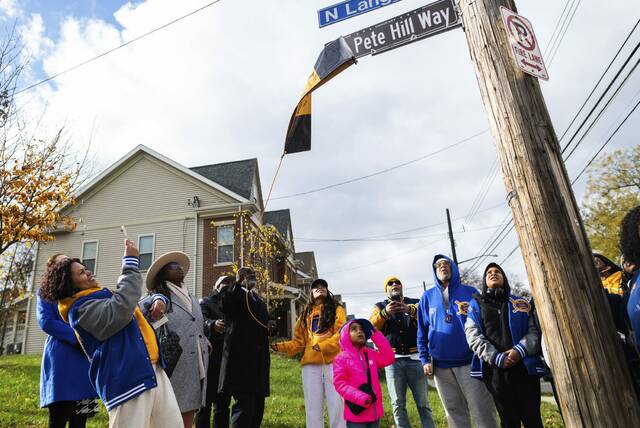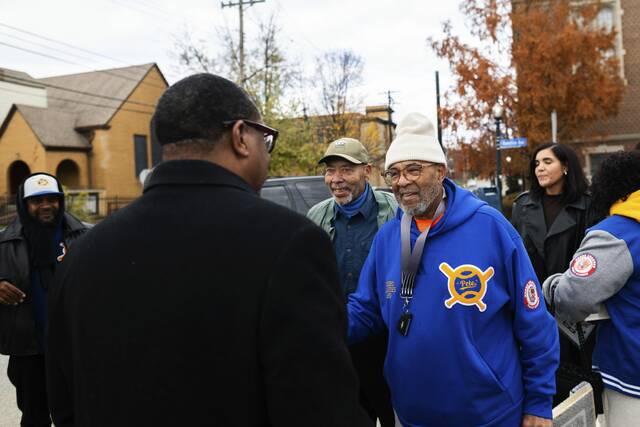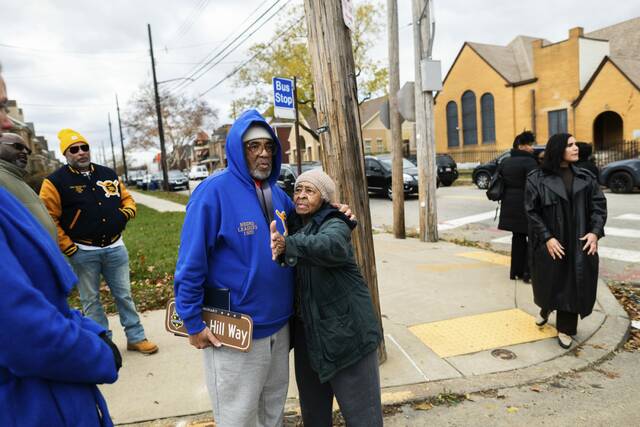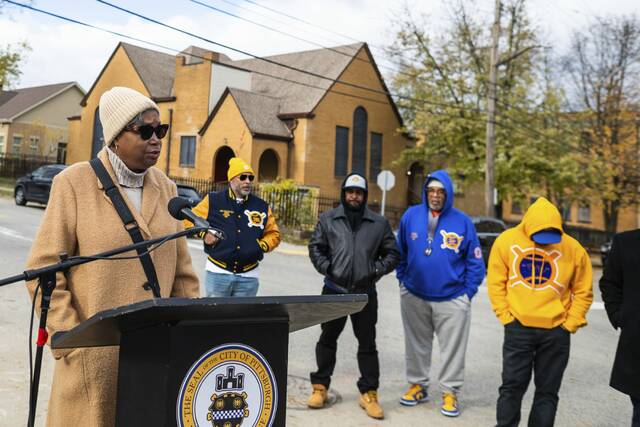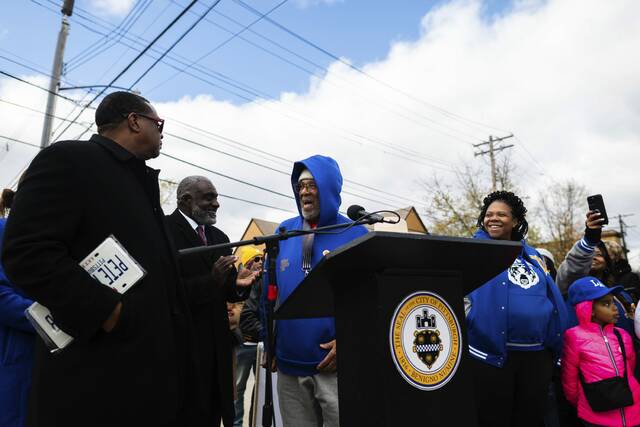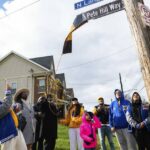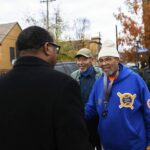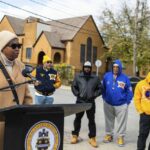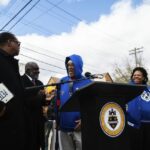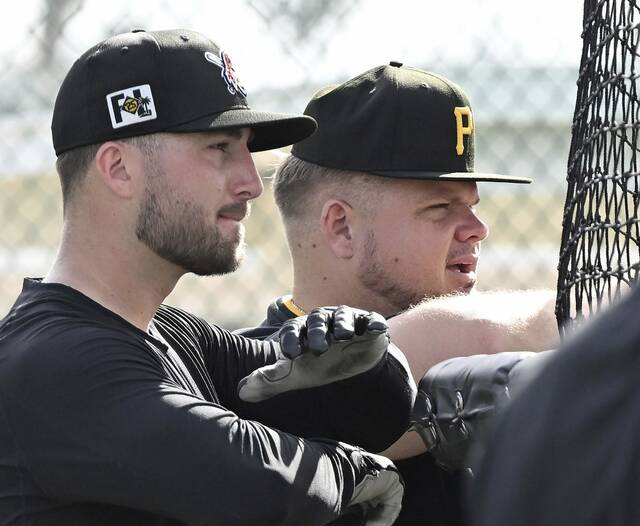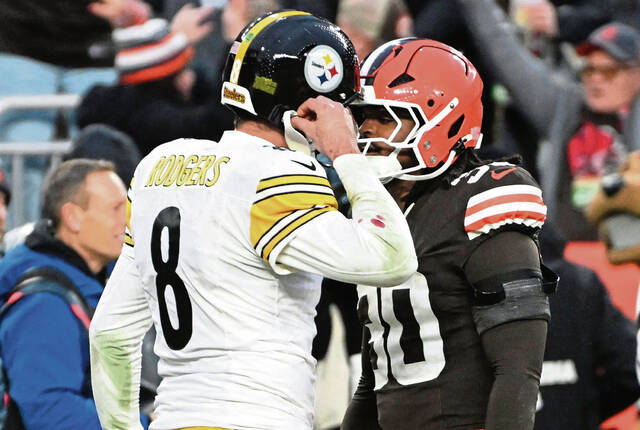As two dozen members of his family smiled with pride, the sign for Pete Hill Way was unveiled Monday afternoon amid fanfare at the corner of Hamilton and N. Lang Avenues in Homewood.
They wore blue-and-gold jackets and hooded sweatshirts — the colors of Westinghouse High School — and celebrated the legacy of a baseball great who once walked the same streets and shared their name.
For Ron Hill, discovering that his great-uncle was a Hall of Famer was a revelation that developed into a passion project designed to right some wrongs. It ultimately brought the street-naming ceremony in the community where he can trace family roots to 1899.
“I never thought I’d see the name of a family member on a sign post,” said Hill, 79, a Homewood native who now resides in Frederick, Md. “It’s a legacy for my family because we’ve been here for so long in Homewood. Pete Hill was a pioneer. He was a trailblazer, before Josh Gibson and before Jackie Robinson. When people ride by and see that sign, they’ll have to Google his name and find out why he was recognized.”
Ron Hill only became aware of his family connection to Pete Hill after he was posthumously inducted into the National Baseball Hall of Fame in 2006 in a class that honored 17 Negro Leagues greats.
Through the research of Zann Nelson, a historian and newspaper columnist who wrote a three-part series for the Culpepper (Va.) Star-Exponent, they discovered the Hall of Fame erroneously had his name as Joseph Preston Hill instead of John Preston Hill, so his family wasn’t present for the induction in Cooperstown, N.Y.
Ron Hill discovered that Pete Hill’s baseball career began by playing third base at age 16 for the Pittsburgh Keystones, which preceded the Negro Leagues that featured Homestead Grays and Pittsburgh Crawfords and made the city a baseball hotbed. Pete Hill developed into a dangerous left-handed hitter who, according to newspaper accounts, batted .583 for the Philadelphia Giants in 1905 and .452 the following year to win the batting crown.
His Hall of Fame plaque called Hill “the catalyst and captain of the Chicago American Giants.” He built a reputation as a five-tool player in the dead-ball era because of his defense and arm in the outfield, “constant motion” on the basepaths and ability to hit to all fields and with power. He also served as player-manager for the Detroit Stars (1919-21) and Baltimore Black Sox (1924-25).
With Ron Hill leading the way, they got his Hall of Fame plaque and even his tombstone changed to correct the record. The family created the John Preston “Pete” Hill Foundation and pushed for him to be recognized in his hometown. It found a friend in Pittsburgh Councilman Khari Mosley, a baseball fan who represents District 9 and was thrilled to honor Pete Hill with the street that runs alongside Willie Stargell Field “exactly 100 years after his final season as player-manager of the Baltimore Black Sox.”
“This day holds deep personal significance because, by honoring Pete Hill, we educate current and future generations about a trailblazer who paved the way for so many,” Mosley said at the ceremony. “We also acknowledge Pittsburgh’s unparalleled contribution to Black baseball, celebrate the rich heritage embedded into the DNA of this region, especially in neighborhoods like Homewood. I remain steadfast in the belief that our history, culture and legacy are not only our most valuable natural resources but remain the building blocks for positive transformation of our communities.”
Ron Hill believes two other Hall of Famers from Homewood should receive similar honors. One is Chuck Cooper, a Westinghouse and Duquesne University alum who made history as the first Black player drafted in the NBA by the Boston Celtics in 1950 and was inducted into the Naismith Memorial Basketball Hall of Fame in 2019. The other is Bill Nunn, the Pittsburgh Courier sports writer who became a Steelers scout and was inducted into the Pro Football Hall of Fame in 2021. Ron Hill also would like the Pirates to recognize Pete Hill.
The naming of Pete Hill Way is a start that holds special significance to Mayor Ed Gainey, who claimed that it marked the first time in the Homewood-Brushton community that a street was named after an African-American. Gainey suggested there should be an accompanying marker, to teach the community about Pete Hill’s life and baseball career.
“That’s incredible,” Gainey said in his remarks during the ceremony. “Every one of these streets we walk, but they ain’t named after us. For now to have this street named after one of our pioneers … do you know how that inspiration changes children? Do you know that gives them another lens to be able to see what they can be? … We should also have a plaque here that says who Pete Hill was, so there will be no misunderstanding.”


